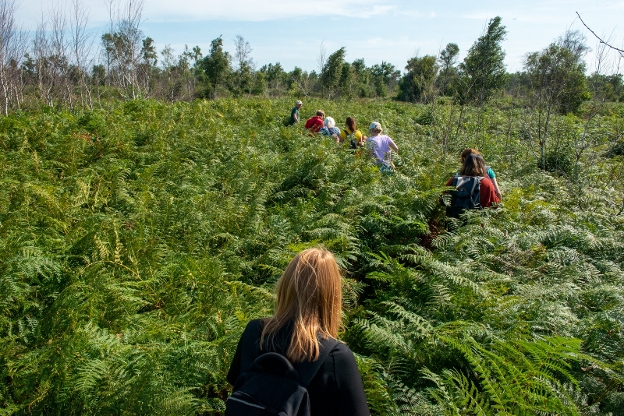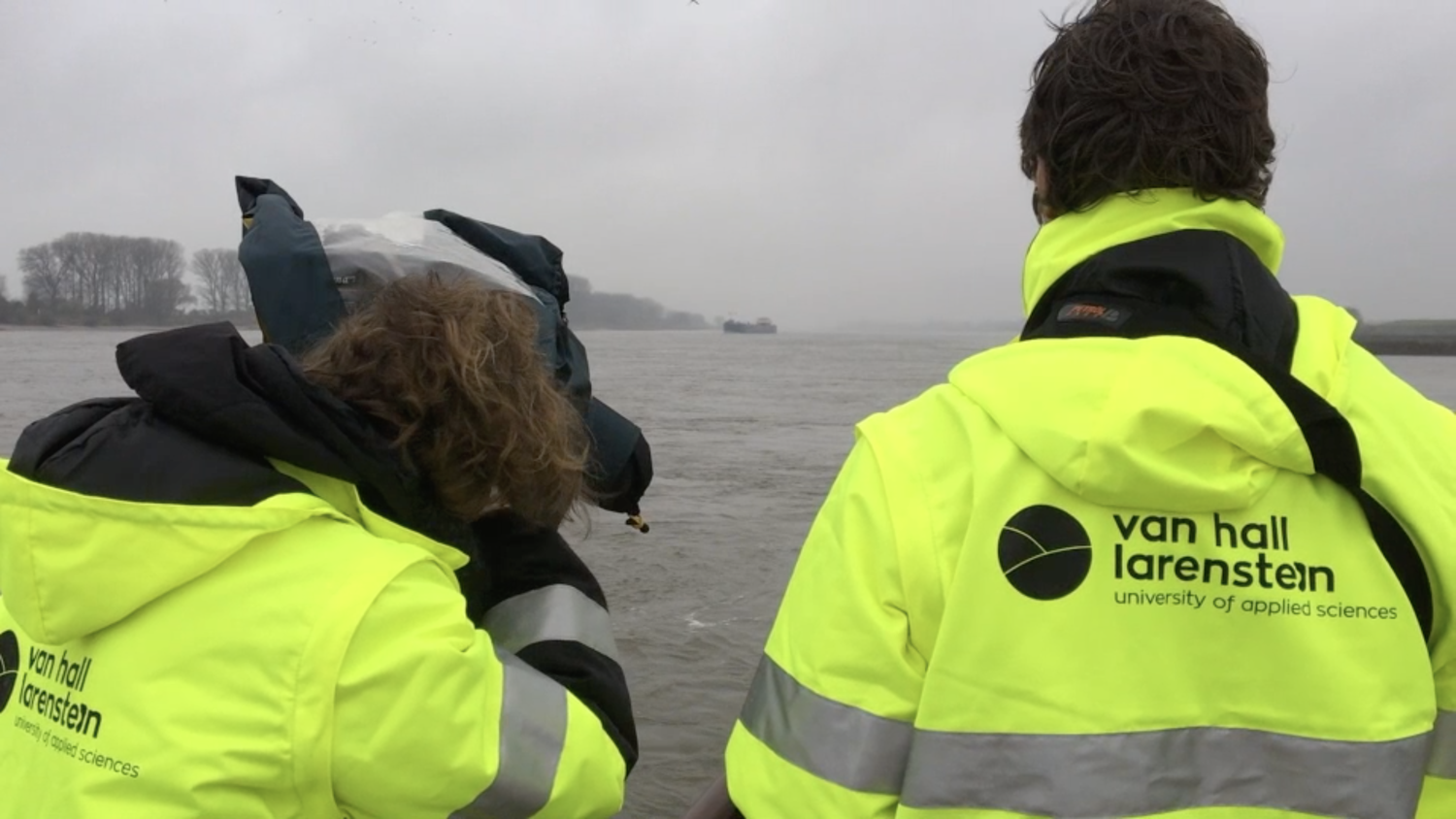Cookies
Van Hall Larenstein treats its customers' information with the utmost care and will never make this information available to third parties. Read more about us Privacy and Cookie Policy

Transitions currently underway in response to climate change, biodiversity loss and resource scarcity call for shared visions of a sustainable future. The Communication, Participation & Socio-Ecological Learning (CoPSEL) research group is contributing to collective transition processes for a sustainable future by conducting research into processes of communication, participation and socio-ecological learning in regional, national and international contexts. The Council for the Environment and Infrastructure referred to this in its recent advisory report ‘Towards a Sustainable Economy: the Governance of Transitions’ when it pointed out that: ‘Transitions require a coherent vision on a sustainable society, despite the uncertainties about how that future will unfold.’ The recent IPCC report also recommends working towards a better understanding of how humans are affecting climate change, to enable us to introduce mitigation and adaptation measures. It also states: ‘Mitigating the risks of a 1.5°C increase in the Earth’s temperature in the context of sustainable development and the eradication of poverty will require systemic transitions, which can be achieved through increased investment in adaptation and mitigation, policy tools, accelerating technological innovation and behavioural change.’ This point underlines the importance of a multi-stakeholder systems approach when we’re tackling challenges in which short-term interests and prevailing paradigms conflict with long-term ambitions, ‘social imaginaries’ and preferred governance practices.
The CoPSEL group is focused on knowledge creation, participatory governance and social dialogue through partnerships set in open innovation systems such as ‘Living Labs’, bringing together the private sector, civil society, universities or research institutes and the government. Applying an ‘experience capitalisation’ perspective emphasises the group’s interest in documenting and sharing research outcomes that can be put to use by the private sector, academia and society as a whole.
CoPSEL is a transdisciplinary applied research group that works in an integrative way. CoPSEL is located in the Applied Research Centre (ARC) in Velp and works with a variety of applied research groups within ARC Velp and ARC Leeuwarden. It also collaborates with various research groups in other universities in the Netherlands and abroad. The applied research group contributes to the curricula of a number of HVHL Bachelor’s degree programmes (Land and Water Management, Management of the Environment, Coastal and Marine Management, International Development Management, Forest and Nature Management) and international Master’s programmes (Management of Development, Agricultural Production Chain Management, Innovative Dairy Chain Management and River Delta Development).
Dr. Loes Witteveen - professor: [email protected]
Dr. Jan Fliervoet - senior researcher: [email protected]
Lecturer-researchers in the group:

VPA Rijntakken
The ‘Rhine River Branches’ Visual Problem Appraisal is developing strategic guidelines for a complex, multi-stakeholder framework for the sustainable management of the Rhine and its tributaries in the Netherlands. The VPA is a tool for innovative governance, drawing on social learning and participatory processes. For example, it enables the creation of sustainable resource management ‘social imaginaries’, and policy platforms for communication with regard to the sustainable future of rivers.
VPA Rijntakken ‘The Making of’ https://vimeo.com/255015151
Trailer VPA Rijntakken https://vimeo.com/346093899

VPA Kerala’s Coast
In 2018 and 2019, heavy rainfall in the monsoon season led to severe flooding in the southern Indian state of Kerala. More than 483 people were reportedly killed, at least one million people were displaced from their homes, and the damage amounted to more than US$5.8 billion. According to the local government, one sixth of Kerala’s total population was directly affected by the floods and by related incidents. This was the context in which a new version of VPA Kerala's Coast came about. It was made in 2003-2004 by an interdisciplinary team at Cochin University of Science and Technology and the Aurora studio in India, in partnership with the Delft University of Technology, Wageningen University and Van Hall Larenstein University of Applied Sciences. VPA Kerala's Coast 2.0 has been developed to contribute to problem analysis, policy design and social dialogue in the context of participatory governance. The visual documentation and comparison of perspectives on climate change, the risks associated with it, and climate adaptation in Kerala – now and 15 years ago – is also relevant to the delta management issues seen in the Netherlands. VPA Kerala's Coast 2.0 is a new tool that can be used as part of teaching and training, and it enables a long-term research perspective on climate change, social resilience and adaptive governance.
Trailer VPA Kerala’s Coast 2.0: https://youtu.be/exqx-Wh4CSM
Living Lab Delta Oost en VPA Dutch DeltaLiving Lab Delta East covers the urbanised part of the Dutch river delta near Arnhem and Nijmegen, where the Rhine branches off into the Waal, the Nederrijn and the IJssel. There are a lot of different stakeholders and priorities in the region, ranging from shipping to mineral extraction, agriculture, urbanisation, nature and recreation. Another priority is the climate resilience of the Dutch river delta, and its ability to withstand extremely high water levels. Living Lab Delta East creates an arena for linking complex water management issues from the urbanised part of the Dutch river delta to a variety of challenges related to governance, knowledge and communication and the quest for a sustainable future. The challenges in this river delta are so complex that no single organisation or body can solve them on their own. The Living Lab approach brings research institutes, businesses, governments and civil society together so they can collaborate on innovations. The river landscape and sustainable river management are inherent features of the Dutch delta and in that sense they contribute to our identity as a nation that lives below sea level and has spent hundreds of years fighting water. The New York Times described the pride that the Dutch take in their identity and water expertise as follows: ‘It is not just a bunch of dikes and dams, but a way of life.’

Methodologically, Living Lab Delta East has a strong focus on communication and participation in transition processes for a sustainable future. Its interpretation of innovation considers various aspects of orgware, hardware and software models that can be used to unravel, predict and develop transformation pathways. As part of the European INVEST project, Living Lab Delta East offers international students the opportunity to participate in a live setting with multiple stakeholders.
There are plans to develop a VPA Dutch Delta, in coordination with the VPA on sustainable river management, which will shed more light on the Dutch water system and governance context as a learning resource for international water communities.
Living Lab Enrekang: Digital Farmer Field School
Climate change is exacerbating challenges related to sustainable agriculture in the district of Enrekang in Indonesia. A number of different organisations are therefore working together in a research lab on the integration of agricultural and environmental knowledge systems in these mountainous rural areas. COVID-19 has increased the urgency of having a platform for distance learning and communication in rural areas. The local government and the University of Muhammadiyah Enrekang (UNIMEN) have invited the CoPSEL group to participate in some exploratory activities based on their expertise in Digital Farmer Field Schools (DFFS), acquired during the Ebola epidemic in Sierra Leone. The Enrekang DFFS is a digital learning platform for tablets which gives farmers a way of accessing information on sustainable agricultural and environmental practices. The local design team for the Enrekang DFFS, which consists of a transdisciplinary team including relevant government agencies and research institutions, is currently being trained by the CoPSEL group with funding from Nuffic. The training on the user experience and the design of user interfaces has led to various outcomes, such as a seasonal calendar, a book of user stories, established design principles, and a detailed vision for inclusive and responsible knowledge sharing.
DFFS Enrekang prototype test Baroko, October 26, 2022
Lia Nurdahalia at the International Conference on the Assessment and Development of Agricultural Innovation. ICADAI July 2021. Bogor. Indonesië. ttps://youtu.be/LeDYq-r9Sm4
Cocoa Training in Times of Ebola Sunday Morning Reflections of Mohamed Fofana https://youtu.be/SjI7xEzlMJE
VPA Climate Change Adaptation Philippines
In partnership with the applied research group on Circular Economy and Water Resources Management. Local approaches to supporting agricultural productivity and controlling the impacts of climate change in indigenous communities in Aurora Province, the Philippines. VPA Climate Change Adaptation Philippines is a partnership with Reading University (UK). https://www.facebook.com/NewtonAgham/videos/408312300011454/
Public participation in climate adaptation in the NetherlandsWe have partnered with HZ University of Applied Sciences, Rotterdam University of Applied Sciences and Hanze University Groningen to film a series of interviews as a form of mediated participation. Finding out how members of the public use their gardens can generate opportunities for them to participate in climate adaptation.
Carbon Connects (EU Interreg Northwest Europe)
The CoPSEL group is developing an online interactive learning environment under the working title of: Peat Experience Activity Territory and Peat Experience Activity Town (PEAT). PEAT will provide opportunities for a wide range of activities and different users, with knowledge elements that education providers can merge into units for vocational and Bachelor's degree courses. It’s aimed at young farmers with an interest in exploring new business models, crops and experiences with other forms of land use; students visiting the PEAT ‘city’ as part of their curriculum on climate-resilient land use; and young people with an interest in climate or environmental activism who are looking to deepen their understanding of issues related to peatlands and greenhouse gases.